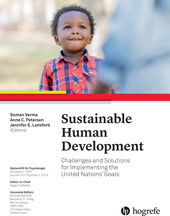Abstract
Abstract. The Sustainable Development Agenda (United Nations, 2015) emphasizes measurement and monitoring progress of the Sustainable Development Goal (SDG) targets, stressing the need for “a data revolution for sustainable development … to improve the quality of statistics and information available to citizens and governments” (UN, 2013, p. 21). Children, adolescents, and youth are also a focus of concern. A number of longstanding cohort studies in developing countries have produced a range of important findings on children’s well-being and development. At the same time, there is growing recognition of the potential of longitudinal research to contribute evidence for policy, insofar as it facilitates understanding of the dynamic nature of developmental trajectories and of the diverse processes that shape outcomes over time. Drawing on a systematic analysis of 122 longitudinal studies on children, largely from low- and middle-income countries (LMICs), as well as an in-depth survey of 31 of these studies, this paper highlights successes, gaps, and challenges where research could inform public policy decisions that promote achievement of the SDGs. The paper unpacks how longitudinal data can be a resource for understanding the drivers underpinning SDG indicators and could provide an assessment of the timing of development windows, and related interventions to maximize the impact of interventions. The paper concludes by identifying core features of a policy-driven research agenda for longitudinal studies to guide researchers and funders.
References
(2017). Children’s participation in economic activities and household chores in Malawi: A qualitative study on the Malawi social cash transfer programme. [UNICEF Innocenti Research Brief]. Retrieved from https://www.unicef-irc.org/publications/pdf/IRB2018-03%20Effects%20of%20Cash%20Transfer%20Programmes.pdf
. (2017). Longitudinal studies strategic review. Retrieved from https://esrc.ukri.org/files/news-events-and-publications/publications/longitudinal-studies-strategic-review-2017/
. (2018). Low and middle income longitudinal population study directory. Retrieved from https://www.ifs.org.uk/tools_and_resources/
(2014). Translating research from cohort studies into policy: The case of Jamaica. Paper presented at the UNICEF Office of Research.
(2014). A place for panel data in the “data revolution”. [ODI Briefing note 92]. Retrieved from https://www.odi.org/publications/8822-place-panel-data-data-revolution
. (2014). UNICEF’s Office of Research – Innocenti 2014 results report. Retrieved from https://www.unicef-irc.org/publications/774-2014-results-report.html
. (2016). Uprooted: The growing crisis for refugee and migrant children. Retrieved from https://www.unicef.org/publications/index_92710.html
. (2015). 100 key questions for the post 2015 development agenda. Retrieved from http://www.unrisd.org/80256B3C005BCCF9/(httpAuxPages)/AC45AB8A6F43AFA2C1257E0E006A9993/$file/100%20questions.pdf
. (2015). Transforming our world: The 2030 agenda for sustainable development. [Resolution adopted by the General Assembly]. Retrieved from http://www.refworld.org/docid/57b6e3e44.html



